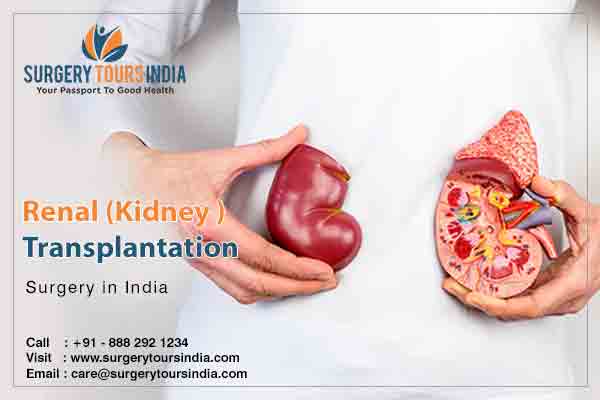
Renal transplantation, also known as kidney transplantation, is a major surgical procedure which allows for replacing the damaged or malfunctioning kidney with a healthy donor kidney. The donor kidney could be harvested from a live donor or a cadaver.
The kidneys are responsible for removing excessive fluid and waste from the blood. In case the kidneys start to malfunction or get damaged, they lose their filtering ability and the fluid levels and impurities in the blood rise to dangerous levels. This condition is known as kidney failure (end-stage kidney disease).
Renal transplant is the most effective and successful treatment method in case of severe kidney malfunctioning.
In case both the kidneys face damage the person may need only one healthy donor kidney to replace the failed kidneys and restore the filtering function in the body.
Renal transplantation is needed to treat kidney failure, or end-stage kidney disease. This condition causes the kidneys to malfunction, or function at a slightly lower than normal levels to remove the waste and excess fluid from the blood.
Dialysis is an option for rehabilitation but a renal transplantation is the only treatment option for kidney failure or end-stage kidney disease.
Kidney failure (end-stage kidney disease) is mostly caused by:
At times, certain kidney diseases can be managed using medications and altering the diet for treating the underlying cause of the condition in the kidney.
In case these medications fail to help the kidneys function normally then you might be considered an ideal candidate for renal transplantation.
Renal transplantation are performed using general anesthesia in order to avoid pain and discomfort to the patient during the procedure.
The surgery begins with the surgeon making an incision in the lower abdomen to the side where the damaged kidney is located. This incision is used to gain access to the damaged kidney after gently shifting aside the abdominal organs.
In case the damaged kidneys may be causing other complications, such as high blood pressure, infection, pain or kidney stones, the surgeon will not need to remove them.
The surgeon will attach the blood vessels to the donor kidney after detaching them from the damaged kidney and placed in the lower abdomen, above the leg.
The surgeon will then reconnect the ureter from the kidney to the bladder.
This surgery usually takes around 3-4 hours of operational time.
Recovery after a renal transplantation is a longer process as it is one of the major surgical procedure and an organ transplant surgery.
You might be required to stay in the hospital for observation for several days to a few weeks as the doctor checks for signs of organ rejection by the immune system in the body. The urination process starts almost immediately as the kidneys start functioning when connected to the blood vessels and the bladder.
You might experience some amount of pain and discomfort at the surgical site for a few days.
Certain medications are required to be taken permanently and regularly. These are often immunosuppressant drugs that inhibit the immune system in the body to some degree which allows for less chances of organ rejection. Other medications are meant to provide relief from the pain as well as help fight against infection.
India has the world's largest and most comprehensive healthcare network that spreads across all its major cities. This extensive healthcare network maintains global-class standards of quality. These hospitals and clinics are equipped with the most modern medical equipments and technology. The doctors and surgeons in these advanced healthcare facilities are the most experienced and well-trained in their respective fields. Surgery Tours India is well-connected to this vast network of super-specialty hospitals and clinics that offer the best and most efficient organ transplants. Surgery Tours India offers every patient from abroad with a truly bespoke package for getting the best and most effective renal transplantation in India at the most affordable cost ever.
For more information please contact us at
Email: [email protected]
Phone: +91-888 292 1234 / +91-9730 001 540